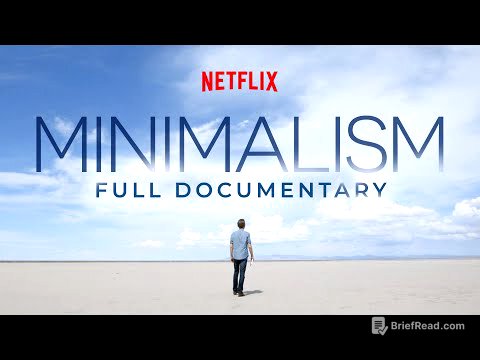TLDR;
The video explores Albert Camus' philosophy of absurdism as a response to the inherent meaninglessness of life. It contrasts nihilism and existentialism, then introduces absurdism as a way to revolt against meaninglessness by embracing the joy of being, freedom, and rebellion against the harshness of existence. The video uses the story of Ernest Shackleton's expedition as an example of absurdism in action, highlighting the crew's ability to maintain humanity and find contentment in the face of extreme isolation and uncertainty. Ultimately, absurdism is presented not as an answer, but as a way to live with the unanswerable questions of life, finding joy and meaning in the face of the unknown.
- Nihilism suggests life is meaningless.
- Existentialism emphasizes freedom and personal responsibility in a world without inherent purpose.
- Absurdism, as proposed by Albert Camus, involves recognizing the conflict between our need for meaning and the universe's indifference, and rebelling against this absurdity by living passionately and freely.
Introduction: Nihilism, Existentialism, and the Search for Meaning [0:00]
The video starts by contrasting nihilism, the belief that life is meaningless, with existentialism, which posits that while there may not be inherent meaning, individuals are free to create their own. Existentialism emphasizes personal responsibility, highlighting that every decision is one's own, and no one is coming to the rescue. The speaker expresses sympathy for existentialism, noting the perceived lack of competent authority figures in the world today. The beauty of existentialism lies in the ability to self-create meaning, where life is not something done to one, but something one does.
Albert Camus and the Absurd [0:58]
Albert Camus agreed with existentialism's diagnosis of freedom but disagreed with its prescription. He believed that humans are machines hungry for meaning in a universe that is cruel, unpredictable, and apathetic. Camus outlined three possible responses to this absurd situation: suicide (refusing to play the game), a leap of faith (believing in some higher meaning), or absurdism. Absurdism involves fully recognizing and accepting the absurd nature of our existence, embracing life in spite of its meaninglessness, and revolting against meaninglessness itself. According to Camus, the only way to deal with an unfree world is to become so absolutely free that one's very existence is an act of rebellion.
The Contradictions of Existence [2:35]
The speaker introduces several paradoxes and antinomies, such as the question of why there is something rather than nothing, the divisibility of matter, and the nature of time and choice. These unanswerable questions highlight the inherent contradictions in our understanding of the universe. The speaker also touches on human paradoxes, such as why terrible things happen to good people, the struggle to control our minds, and the nature of consciousness. These paradoxes contribute to the sense of meaninglessness and hopelessness that can lead to nihilism.
The Shackleton Expedition: An Absurdist Tale [6:03]
The video uses the story of Ernest Shackleton's 1914 expedition to Antarctica as an example of absurdism in action. After their ship, the Endurance, was crushed by ice, Shackleton and his crew were stranded in a hostile environment with little hope of rescue. Despite their dire circumstances, the crew maintained their humanity, putting on plays, taking moonlight walks, and laughing often. This ability to find contentment and meaning in the face of extreme adversity exemplifies the spirit of absurdism.
Living with Absurdity [7:34]
The speaker draws a parallel between the stranded crew of the Endurance and our own existence, suggesting that we are all marooned in this era, in these situations, in these bodies, by physics and chaos and biology and history. Camus's response to this predicament is to live with passion, freedom, and revolt. This means pursuing the joy of being, choosing to live and create hope internally, and rebelling against the harshness and strangeness of existence itself. Absurdism encourages us to dance in the mystery, rebelling against the lack of sense by being better, kinder, and weirder, living inside a paradox and still doing the dishes.
Absurdism as a Response, Not an Answer [9:21]
Absurdism isn't an answer to the mysteries of life, but a way of engaging with them. It involves acknowledging the possibility that we may never achieve final explanations or see the big picture, and replying to oneself with a sense of wonder and appreciation for the present moment. It's about recognizing that we're alive, which is unprecedentedly weird and cool, whether it's fully explained or not.
Book Plug [10:17]
The speaker plugs his book of poetry called "Poems for the Lost", which he describes as being about absurdism.









